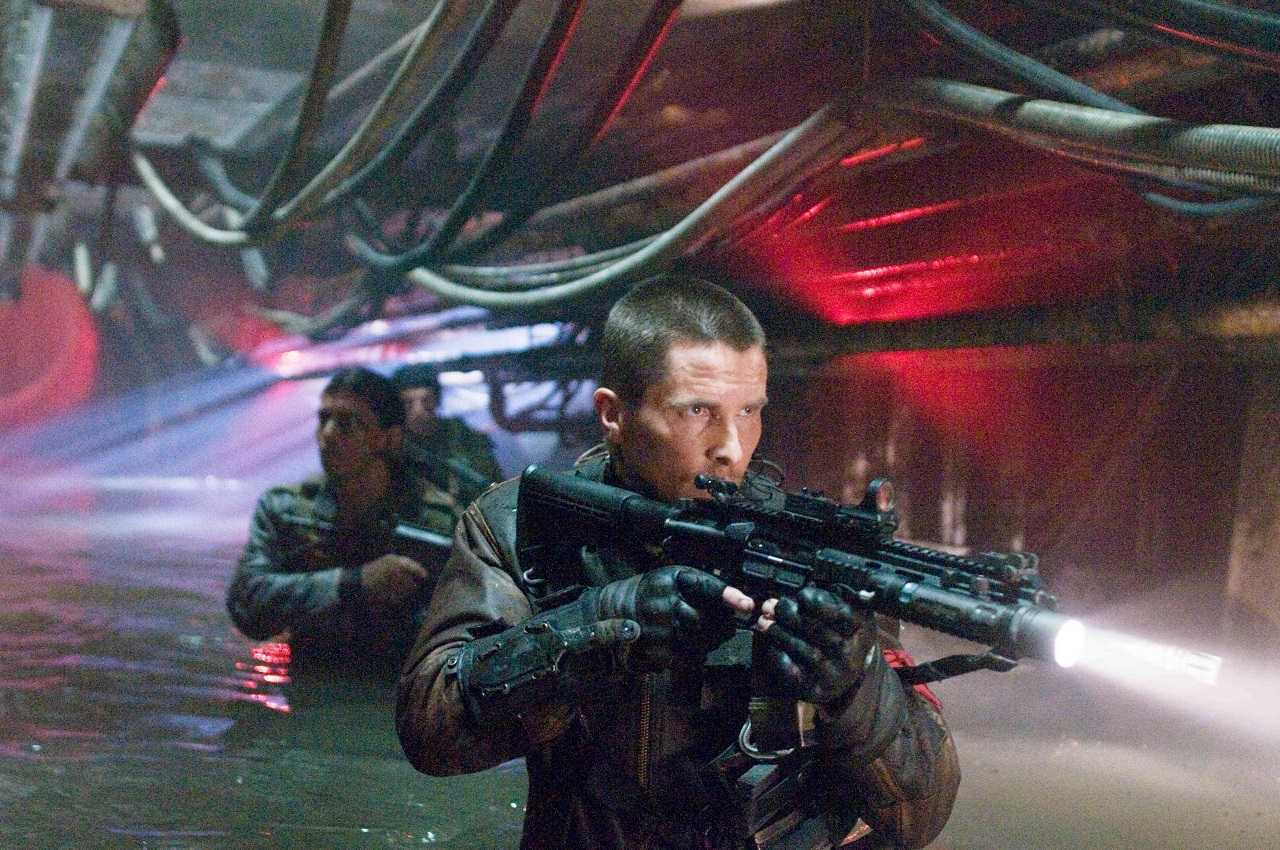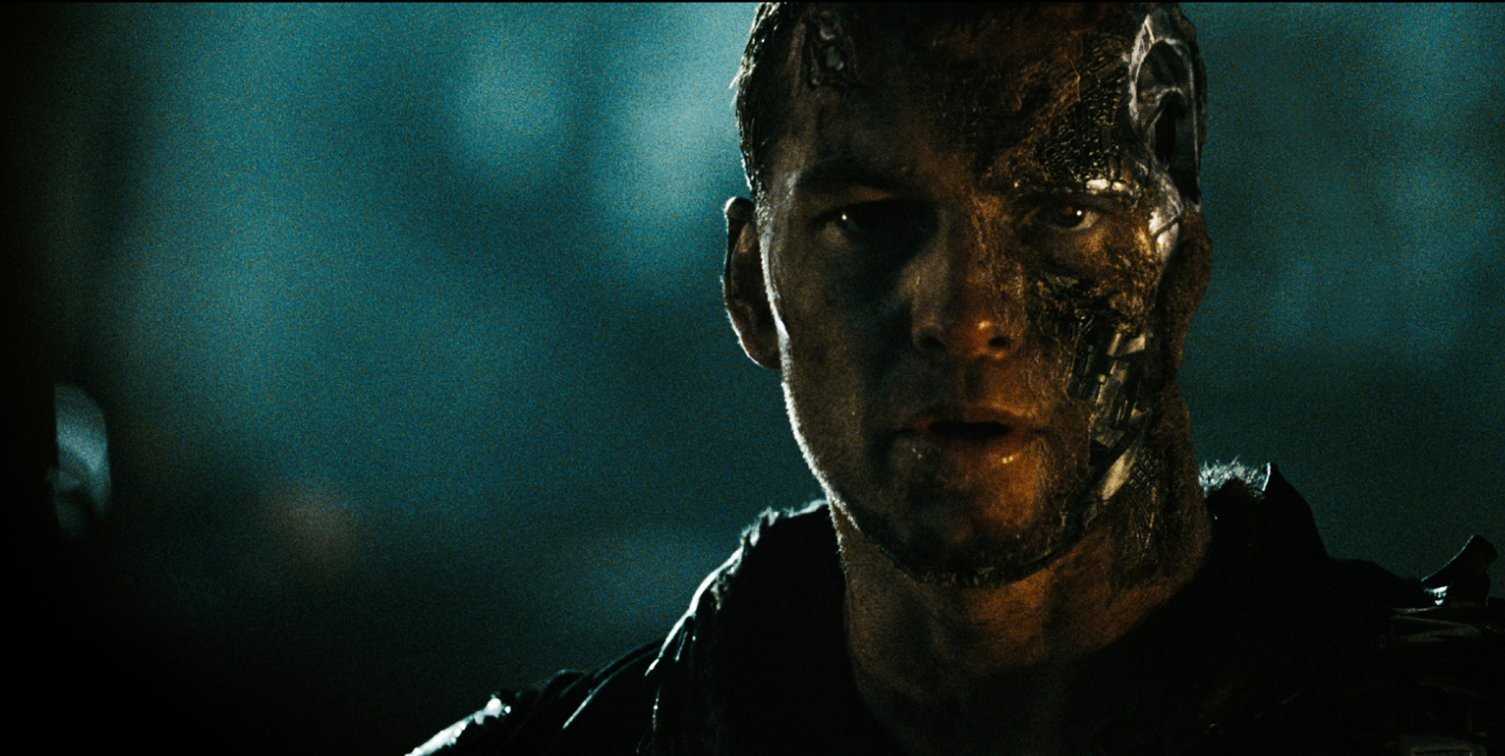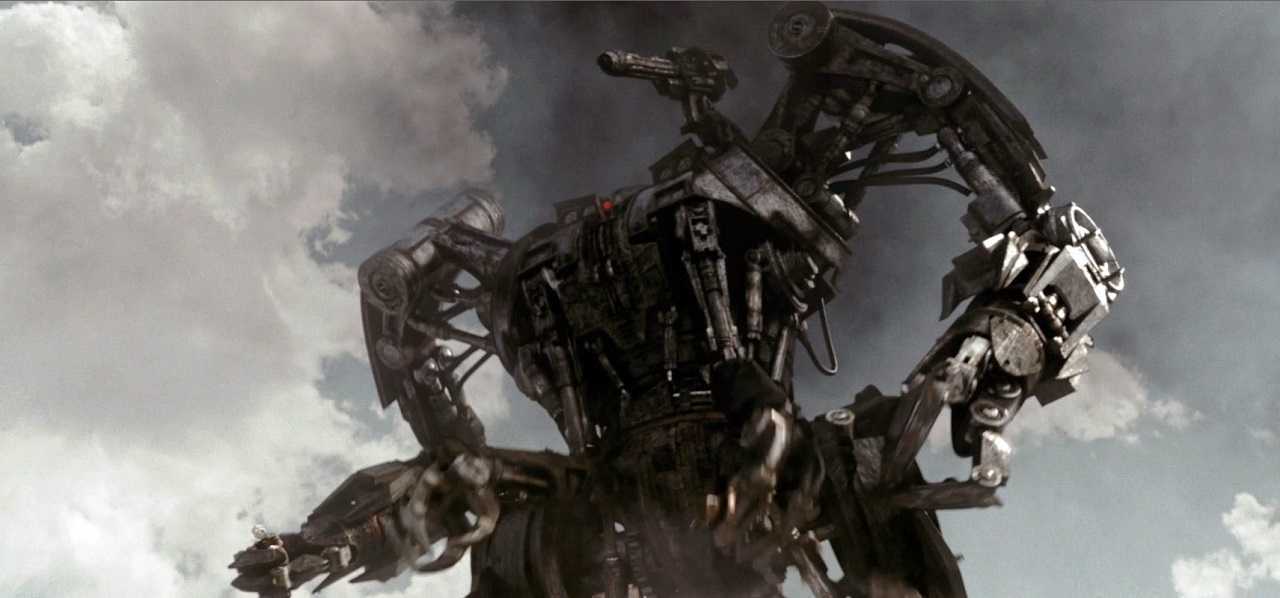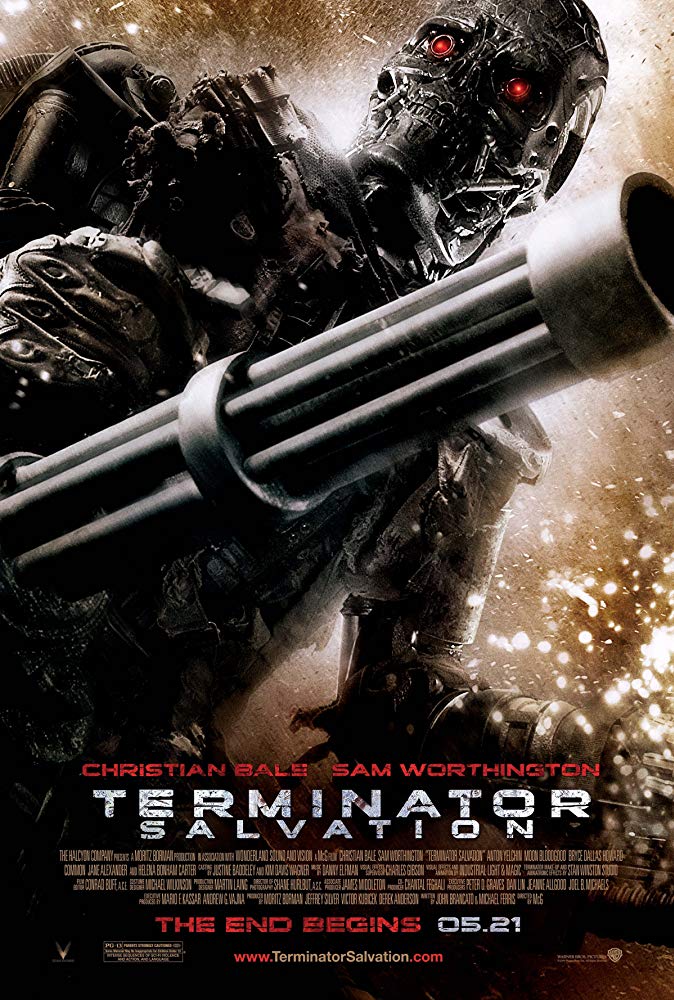USA. 2009.
Crew
Director – McG, Screenplay – John Brancato & Michael Ferris, Producers – Derek Anderson, Moritz Borman, Victor Kubicek & Jeffrey Silver, Photography – Shane Hurlbut, Music – Danny Elfman, Visual Effects Supervisor – Charles Gibson, Visual Effects – Asylum (Supervisors – Phil Brennan, John Fragomeni & Nathan McGuinness), Imaginary Forces, Industrial Light and Magic (Supervisor – Bill Snow), New Deal Studio (Supervisor – Ian Hunter), Pacific Title and Art Studio (Supervisor – David Sosalla), Pixel Liberation Front, Rising Sun Pictures (Supervisor – John Dietz), Sony Pictures Imageworks India, Special Effects Supervisor – Michael Meinardus, Animatronic/Makeup Effects Supervisor – John Rosengrant, Animatronic & Makeup Effects – Stan Winston Studio (Supervisors – Shane Mahan & Lindsay McGowan), Production Design – Martin Laing. Production Company – The Halcyon Company/Moritz Borman/Wonderland Sound and Vision.
Cast
Christian Bale (John Connor), Sam Worthington (Marcus Wright), Anton Yelchin (Kyle Reese), Moon Bloodgood (Blair Williams), Jadagrace (Star), Bryce Dallas Howard (Kate Connor), Michael Ironside (General Ashdown), Common (Barnes), Helena Bonham Carter (Dr Serena Kogan), Jane Alexander (Virginia), Ivan G’Vera (General Losenko)
Plot
It is the year 2018. John Connor is part of the army of rebels fighting against Skynet and the machines in the ruins of civilisation. He learns from his superiors of a weakness in the machines defences – a jamming signal that can turn them off. He also learns that the machines are hunting both him and Kyle Reese. John knows that Kyle will become his father but has yet to meet him. Meanwhile, Marcus Wright, a prisoner who was sentenced to be executed back in 2003, is saved by the teenage Kyle in the ruins of L.A. They flee, pursued by machines, but Kyle is captured and taken to Skynet central in the ruins of San Francisco. Marcus falls into the company of rebel pilot Blair Williams. However, as she takes him to their base, a mine explodes, tearing open Marcus’s skin and revealing that he is part machine, something that is as much surprise to him as it is to them. As the rebels prepare to kill him, Marcus protests that he is not a machine. Blair helps Marcus escape. Marcus and John come to a tenuous truce to agree to rescue Kyle from Skynet. However, the rebel commanders are preparing to launch an all-out military assault on the Skynet base and seem unconcerned that this will kill the human prisoners held there. John realises that failing to rescue Kyle will mean that he will not be born but also requires him to have to defy his superiors.
Terminator Salvation was the fourth of the Terminator films. The series began with James Cameron’s The Terminator (1984) and Terminator 2: Judgment Day (1991), both of which are undisputable classics of the modern science-fiction era. The Terminator was the start of a big spate of time travel films in the late 1980s/early 90s. It didn’t create but certainly imprinted its definitive stamp on the archetypal figure of the unkillable humanoid robot and inspired a great many imitators. It also made the career of James Cameron and a number of others associated with the film, including producer Gale Anne Hurd, actors Linda Hamilton and Michael Biehn and created the one role that Arnold Schwarzenegger will always be associated with.
The Terminator was made on a B+ budget, however by the time of Terminator 2, Cameron was able to call on the biggest budget ever afforded a film at the time. The results were groundbreaking – Terminator 2 was the film that started the modern CGI effects revolution and it is here that the modern action movie’s increasing focus on mass spectacle began.
The Terminator saga did not end there. James Cameron declined to be involved with the series after that point but his producer/former wife Gale Anne Hurd went onto produce the disappointingly lame Terminator 3: Rise of the Machines (2003), which had Arnold Schwarzenegger and a big budget but little else, least of all conviction. There was also the tv series Terminator: The Sarah Connor Chronicles (2008-9), which ended up being half a good series, surmounting a bland first season that mostly centred around blowing up and shooting at things to create some occasionally quite good science-fiction stories by the time of its cancellation (which inauspiciously came a month before Terminator Salvation premiered).
I did not have high hopes for Terminator Salvation, especially in that the script came from John Brancato and Michael Ferris, the same duo who wrote the at-times risible Rise of the Machines. Most of all, what made one’s not-very-high hopes sink was the assignment of the directorial chair to McG. It is probably an unwritten rule of thumb that any director who goes by a single name is someone who is full of their own self importance and whose work invariably collapses into abject pretension – other guilty directorial offenders being Kaos of Ballistic: Ecks vs Sever (2002) fame and Pitof of Catwoman (2004) notoriety, which was also notedly written by Brancato and Ferris. The same one-name truism can probably extend to acting and music – indeed, Terminator Salvation comes with the ill portent of no less than three single-named individuals attached – including also Common and Jadagrace.

McG, or to give him the less pretentious birth name of Joseph McGinty Nichol, emerged as a music video director in the 1990s. He suddenly became a hot Hollywood name on the basis of his first film Charlie’s Angels (2000), which was a hit but also an empty-headed film that stripmined a tv series brand name and reconceived it as some kind of Spice Girls action movie built around a series of slickly revved-up action moves that frequently toppled over into unintentional parody. While the public seemed to like Charlie’s Angels, most of them switched off when it came to McG offering more of the same in Charlie’s Angels: Full Throttle (2003).
Though he has gained a high profile Hollywood name and been associated with a number of other projects, including at one point what emerged as Superman Returns (2006), planned remakes of Blade Runner (1982), Revenge of the Nerds (1984) and a version of 20,000 Leagues Under the Sea, McG has only directed one other film up to that point – the bland We Are Marshall (2006) – although he would subsequently go onto make the spy romcom This Means War (2012), the okay spy action/comedy 3 Days to Kill (2014), the kids save the world from an alien invasion film Rim of the World (2019), the horror film The Babysitter (2017) and its sequel The Babysitter: Killer Queen (2020). Indeed, McG seems to have spent most of his time between Charlie’s Angels and Terminator Salvation lending his name as producer to various tv series, including Fastlane (2002-3), The Mountain (2004-5), Human Target (2010-11), Nikita (2010-3), Shadowhunters: The Mortal Instruments (2016-9) and the huge hits of The O.C. (2003-7), Supernatural (2005-19) and Chuck (2007-12), as well as the absurd videogame horror film Stay Alive (2006) and the Stephen King adaptation Mercy (2014).
Terminator Salvation seemed to befall incredible run of bad luck through shooting – the script underwent numerous rewrites and even then the ending had to be changed after the script that originally ended with John Connor transformed into a cyborg was leaked online; effects creator Stan Winston died in the midst of production; and then there was the damaging leak of a four-minute audio clip of Christian Bale’s rampaging temper tantrum against cinematographer Shane Hurlbut for accidentally walking into a shot; as well as the various producers engaged in legal fighting with one another before the film opened. The production did not exactly get James Cameron’s blessing, despite much claim whether it did or not beforehand, although this eventually only coalesced to Cameron simply wishing McG well and deciding not to prejudge the film before he saw it. (Ominously nobody broadcast Cameron’s views subsequent to the film’s release).
I am happy to confess that my expectations of a McG directed Terminator film did not come out as badly as I imagined they might. In fact, Terminator Salvation is a reasonably watchable film and by no means the disaster that advance US reviews and lower-than-expected box-office returns had it as. Terminator 2 more than admirably followed the dictum of a good sequel in that it expanded on its predecessor, taking it to a whole new level in terms of special effects/action spectacle and introducing the ingenious concept of the shape-changing liquid metal T-1000. Terminator 3 failed miserably at taking a similar quantum leap, producing only B-budget effects and failing to come up with anything to top the T-1000. This is not an omission that Terminator Salvation is guilty of however. The design and effects team give us an amazing new series of Terminators, including giant size robots Terminators that look like they have stepped out of Transformers (2007), as well as an army of skeletal androids, robotic snakes and some nifty looking terminator motorcycle units.

There is very much the sense that McG is trying to make Terminator Salvation bigger-than-big and trying to out-scale Terminator 2. In the first few scenes, we have the entry into an underground complex and its massive destruction in an atomic explosion, followed by Christian Bale crashing in a helicopter and then improbably diving into an ocean that seems about to transform into a storm a la The Perfect Storm (2000) to meet with his superiors.
The film’s showcapper is a foot-to-the-pedal sequence about twenty-five minutes in where McG goes for broke. It is a sequence that starts with the introduction of the giant Transformer Terminator, effortlessly massacring the rebels at the gas station, only for Sam Worthington, Anton Yelchin and Jadagrace to escape in a petrol tanker, dumping its payload in an attempt to blow the Transformer up. The sequence doesn’t end there but continues with the eminently WTF moment when the Transformer ejects the motorcycle Terminators from its ankle struts and we segue into a breathlessly paced sequence as the humans attempt to demolish these using a wrecking ball while racing along a highway at high speed.
The sequence keeps escalating in scale until we have the Transformer blasting apart a bridge, Anton Yelchin snatched up and Sam Worthington battling around the outside of a Hunter-Seeker in mid-air before resistance fighter planes fly into the attack. It is a sequence filled with breathless adrenalin, where McG keeps upping the scale of action and never allowing the heroes a moment’s respite. It is the best sequence in the film and not even the climax manages to top this.
The central focus of the plot is the creation of a new form of Terminator that is a part-human cyborg and does not know of its mechanised nature – shades of Philip K. Dick or tv’s Battlestar Galactica (2003-9). It may seem slightly incredulous that someone with mechanical parts under their skin might not ever notice such – like about surely the first time they cut themselves or underwent a medical exam. And while the character of Marcus Wright is a fascinating new addition to the series, the film never manages to do much more than delve into a few Philip K. Dickian cliches and debate whether the resistance should kill him or not, before having Sam Worthington tear out his chip and reclaim his humanity.
My main beef here is that the main surprise about Sam Worthington being a machine was given away by the film’s trailer. When he turns up in the prologue as an executed prisoner whose body is bought up by Skynet and then later as someone wandering the post-holocaust landscape with no idea of where he is, the film’s one big surprise has been signalled all too clearly. Which is a shame as this could have emerged as a considerable jolt mid-film had the production team been a little more judicious about protecting their surprises.

Outside of that, the script cycles through variants on the plot arcs patented by the first two Terminator films. Where Terminator 2 has John Connor befriending and teaching a Terminator the meaning of humanity, this has John cautiously trusting and finding the human inside a half-human Terminator. Where Terminator 2 has people trying to save the youthful John Connor and protect the future, this has John trying to save the youthful Kyle Reese and protect the causal loop that led to his own birth. (There does seem a big continuity hole here in that clearly we are at a point on the timeline when the machines have not yet invented time travel and have only just started coating the machines with flesh skins, so how do they know that John Connor will grow into the resistance leader and of the future importance of Kyle Reese?).
To its credit, the film does at least abandon the time travel plots of Terminators coming back to the present to eliminate the Connors that were used by all the other films and tv series and ventures into new and different territory to tell the potentially interesting story of the resistance.
Terminator Salvation also comes mired in fannish obeisance. There are numerous quotes of familiar lines from the rest of the series – “Come with me if you want to live” and “I’ll be back” – while Christian Bale’s end voiceover is a slightly rewritten version of Linda Hamilton’s epilogue at the end of Terminator 2. There is even a version of the original Arnold Schwarzenegger Terminator that turns up where Schwarzenegger’s face has been digitised and composited onto the shoulders of a bodybuilder.
Yet, while Terminator Salvation does compete with Terminator 2 in terms of upping the scale of the action and providing a new arsenal of Terminators, what it ultimately lacks is the humanist poetry and depths of character that James Cameron managed to imbue his films with. The end with the machine learning the notion of ‘heart’ as Sam Worthington sacrifices his heart to save Christian Bale is a metaphor that is clunky and overripe to an almost laughable extreme. Contrast that to the beautifully written scenes in Terminator 2 when Linda Hamilton observes The Terminator becoming a father substitute to John and its discovering of a morality. That the film goes out merely parroting the haunting voiceover close to Terminator 2 rather than come up with one of its own, shows a Terminator film that ultimately stands too slavishly in the shadow of its predecessors.
This was followed by Terminator Genisys (2015) with a return appearance from an aging Arnold Schwarzenegger; Terminator: Dark Fate (2019) with return appearances from Arnold Schwarzenegger and Linda Hamilton; and the animated tv series Terminator Zero (2024- ).
(Nominee for Best Special Effects and Best Makeup Effects at this site’s Best of 2009 Awards).
Trailer here


